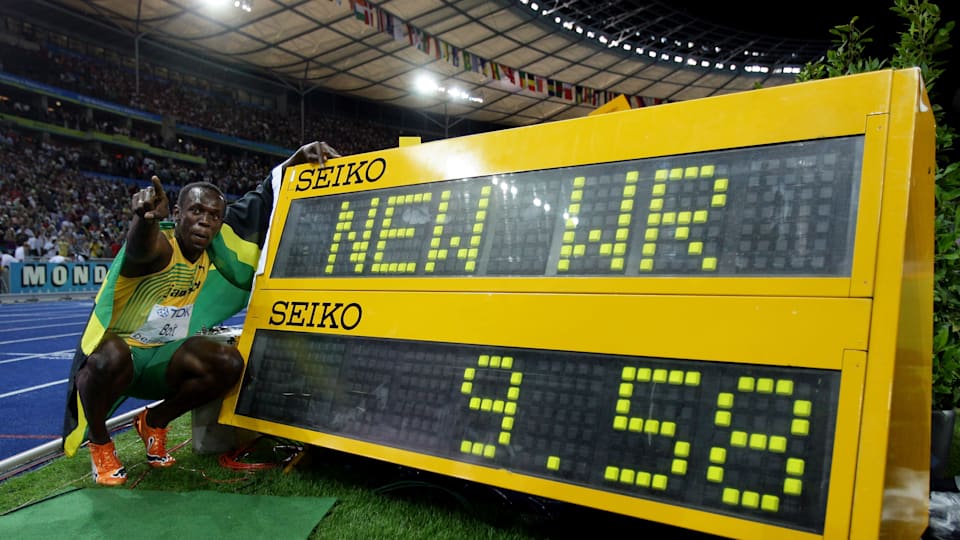
The 100m has long been seen as the acid test for the world’s best sprinters with the holder of the men’s world record often referred to as the 'World’s Fastest Man’.
The first 100m world record to be ratified by the IAAF was recorded 110 years ago in 1912, when the USA’s Donald Lippincott was timed running 10.6 seconds in the qualifying round of the Stockholm 1912 Olympics.
For the next half a century, records were hand-timed before automatic timing for a world record became a requirement in 1977. This was also when records began being timed in hundredths instead of tenths of seconds.
Since 1987, the men’s 100m world record has never stood for more than three years and three months. Until, that is, Jamaican legend Usain Bolt set the current world record in August 2009 - almost 13 years ago.
Bolt’s time of 9.58 seconds saw him reach an astonishing 44.72km/h when he hit full stride in the 100m final of the Berlin 2009 World Athletics Championships.
No other sprinter has broken the 9.60 second barrier, with Bolt registering 9.63 seconds at London 2012 and Tyson Gay and Yohan Blake both hitting 9.69 seconds set in 2009 and 2012 respectively.
Now with the 100m race World Athletics Championships scheduled to begin on 15 July, Olympics.com looks back at the evolution of the 100m world record.
READ MORE: Worlds Athletics Championships; Day-by-day
READ MORE: World Athletics Championships preview
The progression of the world record
After Lipincott’s first official world record in 1912, it took a full nine years for the mark to be broken when Charley Paddock of the USA shaved a full two-tenths of a second from the world’s best time with a 10.4 second run in 1921. Nine more years transpired until Canada’s Percy Williams set a new record in 1930.
But given the nature of the hand-timed records - each only timed to a tenth of a second - six more men would equal that record of 10.3 seconds before 1936, when the great Jesse Owens lowered the mark to 10.2.
Just a year earlier, Owens had pulled off what has been dubbed “the greatest 45 minutes in sport” when he managed world records of 9.4 in the 100 yard dash, 8.13m in the long jump, 20.3 in the 200 yard dash and 22.6 in the 200 yard low hurdles at the Big Ten Championships in Michigan, USA.
READ MORE: The greatest 45 minutes in sport
Then just two months before the 1936 Olympics in Berlin, Owens broke the official 100m world record with a stunning run of 10.2 at the NCAA Track and Field Championships.
Four golds followed at Berlin 1936 as he put in a legendary performance in the capital of Germany. However, while his 100m record was equalled on 10 occasions, it took a full 20 years for anyone to go faster.
When the record did fall, it was another American, Willie Williams who took the title of ‘World’s Fastest Man’ setting a time of 10.01 seconds in 1956.
After West Germany’s Armin Hary ran 10 seconds flat in 1960, attention turned to the first man to break the 10-second mark.
The switch to automatic timing
The world would have to wait eight years for the USA’s Jim Hines to set a time of 9.9 seconds in June 1968, which he followed up with an automatically timed 9.95 seconds at the Olympic Games Mexico City 1968. The record stood for 14 years, eight months and 19 days.
It took until 1991 for someone to officially break 9.9 seconds when the USA’s nine-time Olympic gold medallist Carl Lewis clocked a time of 9.86 in Tokyo. Eight years later, Maurice Green of the USA recorded a time of 9.78 to finally dip under 9.8 seconds in Athens, Greece.
Jamaican dominance
Since 2005, athletes from Jamaica have dominated the 100m world record list, with Asafa Powell setting four world records with a lowest of 9.735 before the emergence of Olympic great Usain Bolt.
Bolt first broke the world record when he set a time of 9.72 in May 2008, before smashing his own mark two months later as he won Olympic gold at Beijing 2008 in a time of 9.69.
But the best was yet to come. In a thrilling sprint that has never been matched to this day, Bolt crossed the finish line at the Berlin 2009 World Athletics Championships in 9.58 to set a world record that is now entering its teenage years.
Will anyone come close to the great man as the world’s best sprinters go head-to-head for the title of ‘World’s Fastest Man’?
